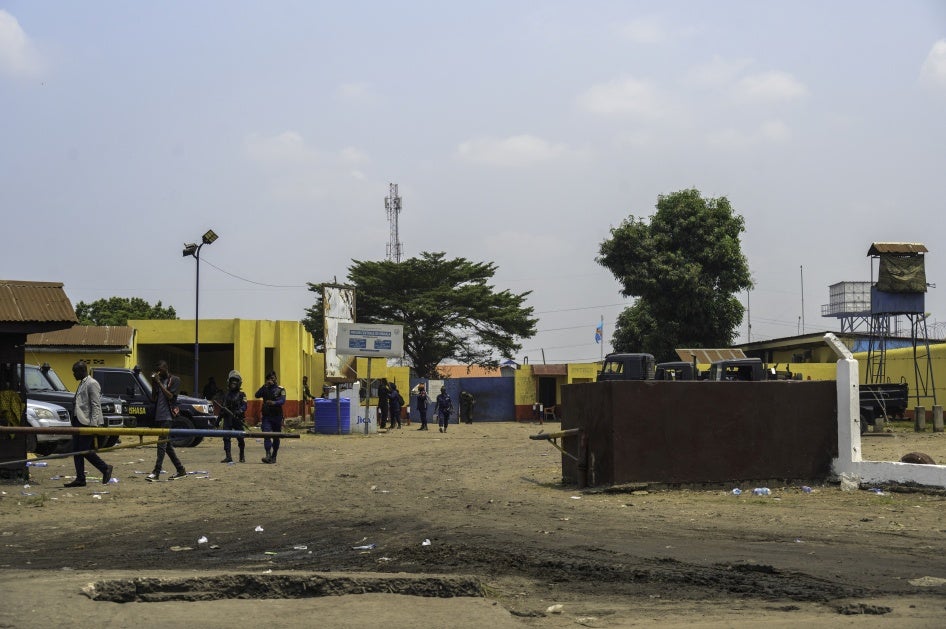(Kinshasa) – Democratic Republic of Congo authorities should promptly and impartially investigate and provide a transparent, credible account of the deadly incident on September 2, 2024, at Makala Central Prison in the capital, Kinshasa, Human Rights Watch said today.
Congolese Interior Minister Jacquemain Shabani announced on September 2 that during an attempted prison break, 129 prisoners died, including 24 shot while trying to escape, and 59 were injured. Several female prisoners were raped. The minister also said that a mixed commission would be created to establish the facts around the incident, without offering details on its composition.
“The Congolese government’s decision to investigate is a positive step toward ensuring that such a tragedy does not happen again,” said Lewis Mudge, Central Africa director at Human Rights Watch. “But the authorities should also take decisive measures immediately to improve the living conditions at Makala prison, in compliance with Congo’s national and international obligations.”
Human Rights Watch interviewed three prisoners by telephone who said that suspected youth gang members, known as kulunas, attempted a mass escape in the early hours of the morning of September 2. Several prison buildings caught fire during the attempted escape.
Makala, like many prisons across Congo, has massive overcrowding, poor infrastructure, and inadequate resources. While details surrounding the escape attempt remain unclear, the authorities claim that officials fired “warning shots” before firing on escaping prisoners. The authorities said that most of the deaths were from a stampede. The prison’s administrative buildings have been destroyed, including its archives, creating significant problems in identifying the exact number and identities of the people who were held in the prison.
The United Nations Basic Principles on the Use of Force and Firearms by Law Enforcement Officials provides that law enforcement officers should only use firearms where there is an “imminent threat of death or serious injury” and “only when less extreme means are insufficient” to prevent such harm. The “intentional lethal use of firearms may only be made when strictly unavoidable in order to protect life.” Where warnings of firearm use can be given, there should be “sufficient time for the warning to be observed.”
The African Commission on Human and Peoples’ Rights and the International Covenant on Civil and Political Rights obligate governments to investigate and appropriately punish those responsible for abuses against people in custody and to provide reparations for victims.
The authorities should publicly provide information about the progress of the investigation and communicate the findings transparently, including about the prisoners killed and injured, Human Rights Watch said. They should also act urgently to provide survivors and victims’ family members with medical care, mental health support, and appropriate compensation.
“I watched women raped by more than one man, including an older woman who was raped,” a female prisoner told Human Rights Watch on September 4. “None of these women has received appropriate medication.”
Sexual violence is a longstanding problem in Congo’s prisons. In September 2020, a prison riot at Kasapa Central Prison in Lubumbashi caused a fire in the women’s section which forced the female prisoners into the main prison yard for three days, where the prison failed to provide them with any protection. For those three days, male prisoners repeatedly raped several dozen female prisoners, including a teenage girl.
The government should adopt urgent measures to preserve the safety and security of people in prison and ensure that everyone, particularly women and girls, is protected from sexual violence, Human Rights Watch said.
Malnutrition and related illnesses have long resulted in deaths in Congo’s prisons and jails. At best, prisoners get one meal a day, in part because food portions are budgeted according to prisons’ capacities rather than their actual populations. In 2020, the media reported that at least 17 people starved to death at Makala prison. Human Rights Watch has previously reported on severe overcrowding, malnutrition, unhygienic conditions, and lack of medical care in Congolese prisons, including Makala.
Security in Makala is also a serious problem. One prisoner told Human Rights Watch on September 4 that “it is not the military or the police, but the prisoners themselves who provide security in each prison block.”
Most people in prison across Congo, including at Makala prison, have not been convicted of any crime and are awaiting trial, and others have been arrested for nonviolent or minor offenses. Makala prison, built in 1957 toward the end of Belgian colonial rule, was designed for 1,500 people but is currently holding between 12,000 and 14,000.
Consistent with the International Covenant on Civil and Political Rights, the government should immediately address dangerous prison overcrowding by releasing everyone in pretrial detention for nonviolent crimes, subject to guarantees to appear for trial, Human Rights Watch said.
Under international law, government authorities have a duty to care for people in prisons, including to protect their rights to life, health, safety, and security. The African Commission on Human and Peoples’ Rights, in its 1995 Resolution on Prisons in Africa, said that African countries should conform to the “international norms and standards for the protection of the human rights of prisoners.”
The UN Standard Minimum Rules for the Treatment of Prisoners (the Mandela Rules) state that people in prison are to be treated with dignity and have prompt access to medical attention, and that in the case of deaths in custody, the prison will report the cases to independent judicial or other authorities to ensure a prompt, impartial, and effective investigation.
“The deaths of prisoners and sexual violence at Makala prison has shined a light on the horrendous, persistent, and systemic problems of Congo’s prison system,” Mudge said. “Further delays in tackling prison overcrowding and appalling detention conditions will continue to put lives at risk.”








